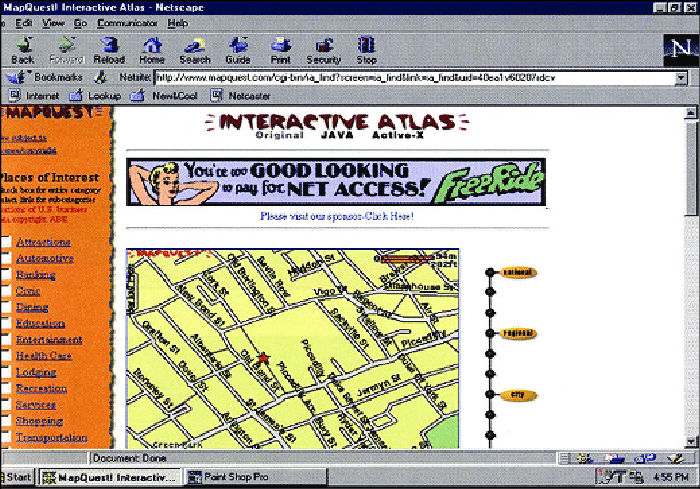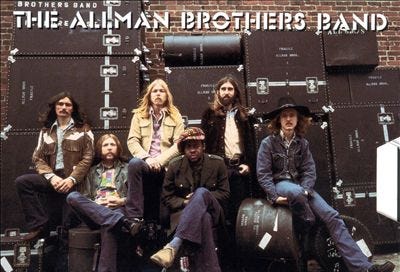The first time I heard the Allman Brothers it was late summer / early fall 2000. I was sitting at the bar in the Blackwatch on North Santa Cruz Avenue in Los Gatos drinking a longneck Budweiser and marveling over the reel-to-reel recorder that someone in the bar operated with ease. Whoever it was behind the bar had a tape of the band from a long ago radio show recorded at the Fillmore East in 1971.
The tight, jazzy blues infused honky tonk sound of the Allman Brothers was something special - maybe it was the analog playback device? I don’t know. I was grooving and happy. Even so, I had a strong sense of being out of place. I hadn’t lived anywhere near Los Gatos for more than a decade and the bar scene gave off that vibe that let me know it would be always be impenetrable to outsiders.
That’s probably a Northern California thing. Although I was raised there, it was never a place where I felt truly comfortable and once I moved to Los Angeles, I never looked back.
But, here I was on Santa Cruz Avenue thinking about being an outsider, sucking down a cold Bud and listening to the Allman Bros bring down the house at the long-closed Fillmore East.
I’m not a stranger to Los Gatos. In the late 70s and early 80s, just up a block or so from the Blackwatch, my buddies and I would go to the midnight movies. The fare was pretty predictable. One week you’d get “Song Remains the Same”, the next week maybe “Jimi Plays Monterey” the week after that “Gimme Shelter.” Sometimes they played “Tommy” or the “Grateful Dead Movie.” I saw “Let it Be” there once also. In high school we’d sneak beer or cheap $2 bottles of champagne into the show and drink until it was gone, rolling the empties down the aisle.
Once, when I was a senior in high school, my companion and I got bold and decided the Coors we carried in our jackets needed to be popped while we waited in line for the box office to open. That was a mistake that resulted in a court appearance that I was able to keep secret for many years.
In the early 2000s, the Silicon Valley insider vibe permeating the Blackwatch also attracted a certain type of clientele to the Carrie Nation bar and later Mountain Charlie’s where Mark Achilli was the owner, managing employees and occasionally mixing drinks. Depending on the narrator, Mark was either Mr. Nice Guy or a complete prick. One former employee said that Mark’s mood depended on the time of the month and whether he’d been snorting cocaine.
One thing’s certain. In 2007 on the leading edge of the Great Recession, Achilli wanted to sell Mountain Charlie’s. A group of buyers including 49ers quarterback Alex Smith expressed initial interest. When they dropped out, a mutual connection brought Paul Garcia and Achilli together. Paul and his brother ended up buying the place.
In one way or another it was his proximity to that bar scene that got Achilli killed. On March 14, 2008, Mark was gunned down outside his Los Gatos apartment on an overcast morning just before noon. Soon, police accused Garcia of masterminding Achilli’s slaying. Garcia, sentenced to life without the possibility of parole, says he was wrongfully convicted in the case and continues to seek a new trial and exoneration.
Throughout their investigation and at the time of Garcia’s trial, Police and prosecutors claimed Garcia and Achilli were in love with the same woman, a barmaid at Mountain Charlie’s identified as Tessa Donnelly. Paul, who was investing in various real estate ventures in late 2007 and early 2008, bought Mountain Charlie’s and 180, a neighboring restaurant, from Achilli in June of 2007 for $1.2 million.
Donnelly had been dating Achilli at the time of the purchase. Soon after Garcia took over, she was dating the new owner. That’s a classic love triangle, and it’s the angle police pursued in their investigation.
But, maybe something else was at work.
Garcia, a one-time freshman football coach at Bellarmine and his family believe that Achilli might have been killed by men seeking payback on a drug debt. Statements made by Robert Jacome, a Southern California resident who was in Los Gatos the day Achilli was shot to death, could support that theory.
Detectives, were led to Jacome by a detailed MapQuest map that was tossed out near the crime scene. The map led to jacome’s house in Burbank. In his narrative of the day of Achilli’s death, Jacome said his friend Lucio Estrada, of Duarte, needed a ride up to Los Gatos.

“Lucio asked me to give him a ride up north ... so he could go talk to some people. So there was a cocaine debt, $60,000, and he was gonna go pick up the money there, you know, so forth and so on and that was it,” Jacome said.
Estrada reached out the night before Achilli’s death. Jacome explained he was chosen to drive because he had a friend living in Ben Lomond, a small Santa Cruz mountain town, just over the hill from Los Gatos. Jacome felt he owed a debt to Estrada whose opriginal plan was getting up north via charter bus.
On the ride up they smoked some pot and listened to tunes on Jacome’s iPod. Using the map Estrada had printed out, the pair arrived in San Jose about 1:30 or 2 a.m., ate some Burger King, and checked into a $200-a-night flop on the San Jose/Los Gatos border. The next morning about 8:30, when Jacome awoke, Estrada was gone. He reappeared around 10 a.m. and had noticeably shaved his goatee. He gave Jacome $100.
Later that morning they were in the Volvo headed to Achilli’s place on Overlook Road. When they got to Achilli’s street, Estrada, dressed in black, popped out of the car. He told Jacome to wait.
After debating if he should go to Ben Lomond, or hang around Jacome decided to wait for Estrada in the parking lot of a drug store nearby on Highway 9.
After 30 minutes Jacome’s phone rang. Estrada was out of breath. He wanted to be picked up. Jacome headed toward the spot where he dropped off his companion and saw Estrada was running down the street wearing different clothes.
“I knew something was fucking wrong,” Jacome said. “I seen two squad cars barreling down the street. I was petrified.”
Estrada was out of breath. He said they should drive home.
“I did it Rob. I did it,” Estrada exclaimed.
Jacome panicked.
“You can’t get away with this kind of shit in a small town. Especially with the money this town has and the resources this town has. I’m thinking, ‘I’m fucked.’”
Jacome’s tale, his belief that he and Estrada were collecting a drug debt, and his subsequent conviction were all part of an extraordinary hearing in Santa Clara County Superior Court this past week. Judge David Cena, the county’s presiding judge heard motions from Paul Garcia seeking to overturn his conviction and Santa Clara prosectors defending their work.
No one’s in Garcia’s family is holding out hope for what they would describe as a miracle, but Cena, after originally announcing he had made up his mind, has made an about face and said he would take Garcia’s request under submission.
The change change came about gradually, Paul’s mother Connie said, explaining she could see it in Cena’s body language.
“At first the judge had arms crossed, then picked up his head and them nodded and then said at the end, ‘This is very interesting I'll make my decision in 2-3 weeks.’ I think it was positive.”




